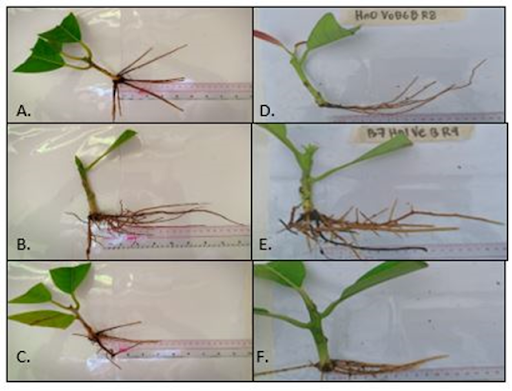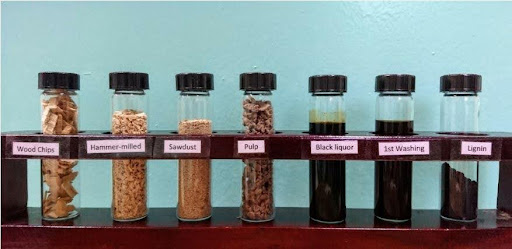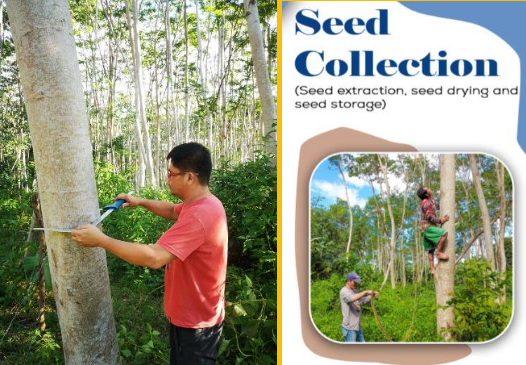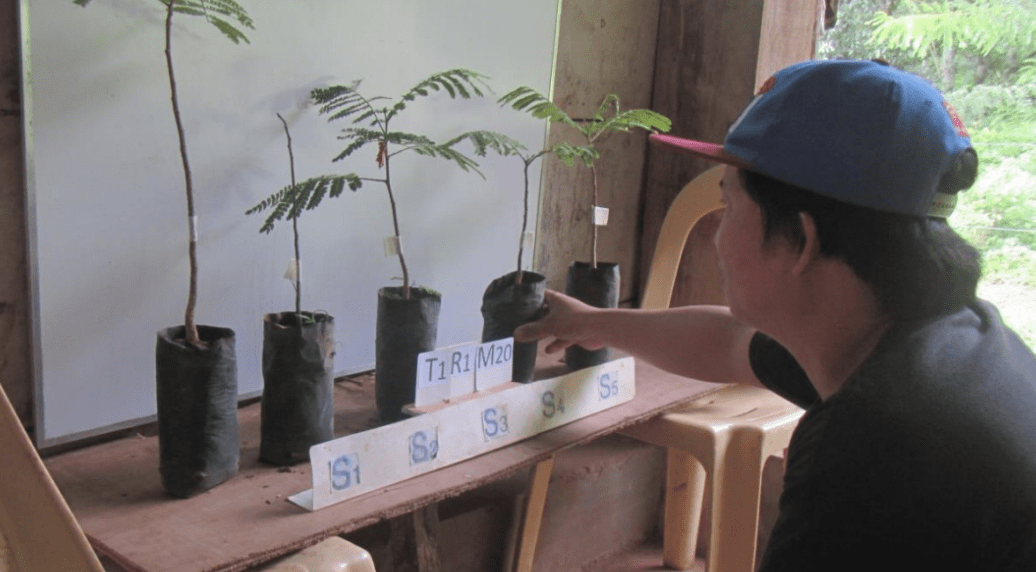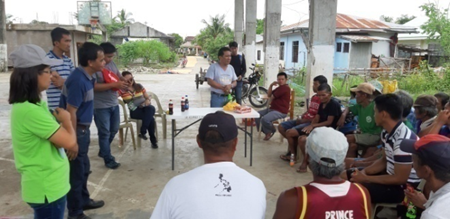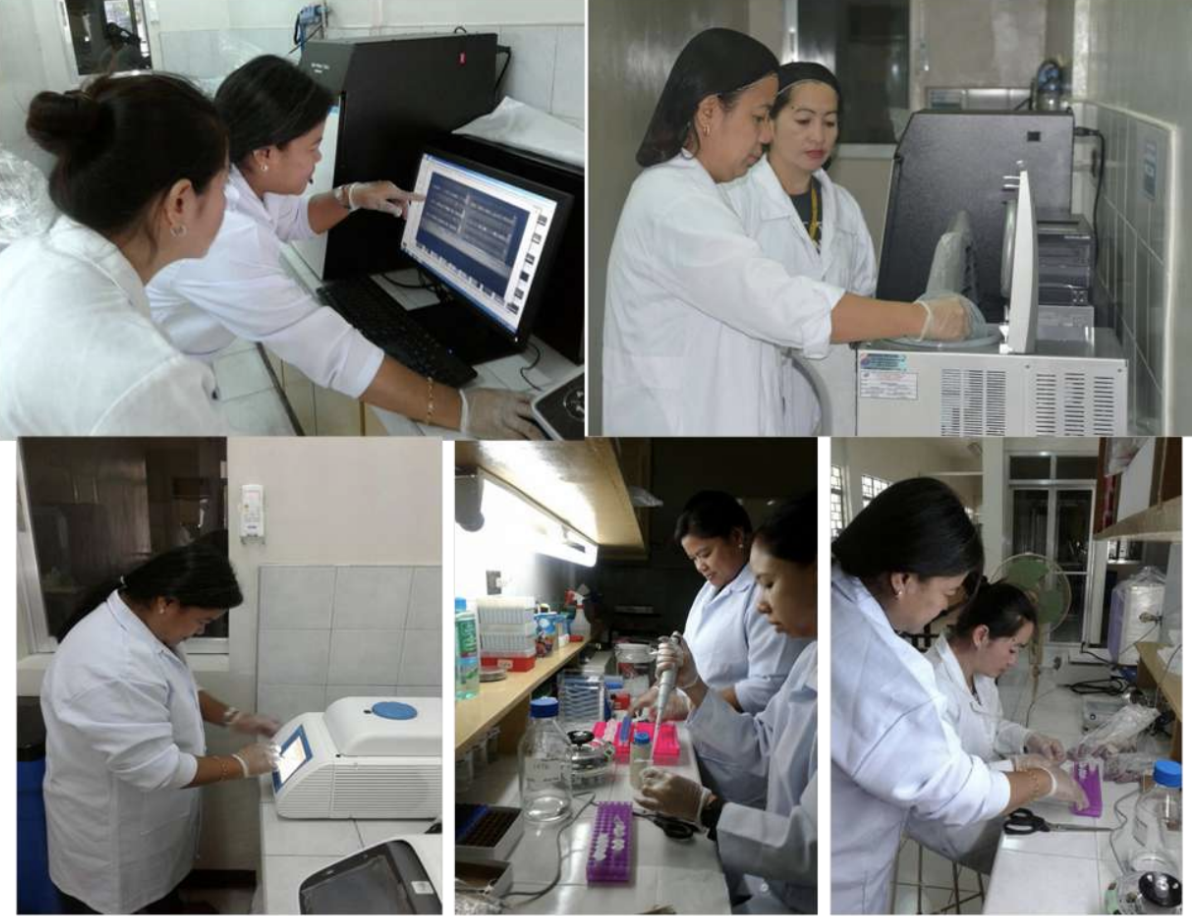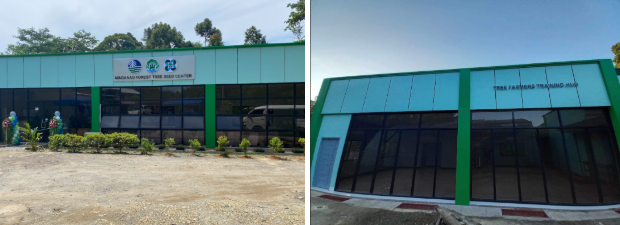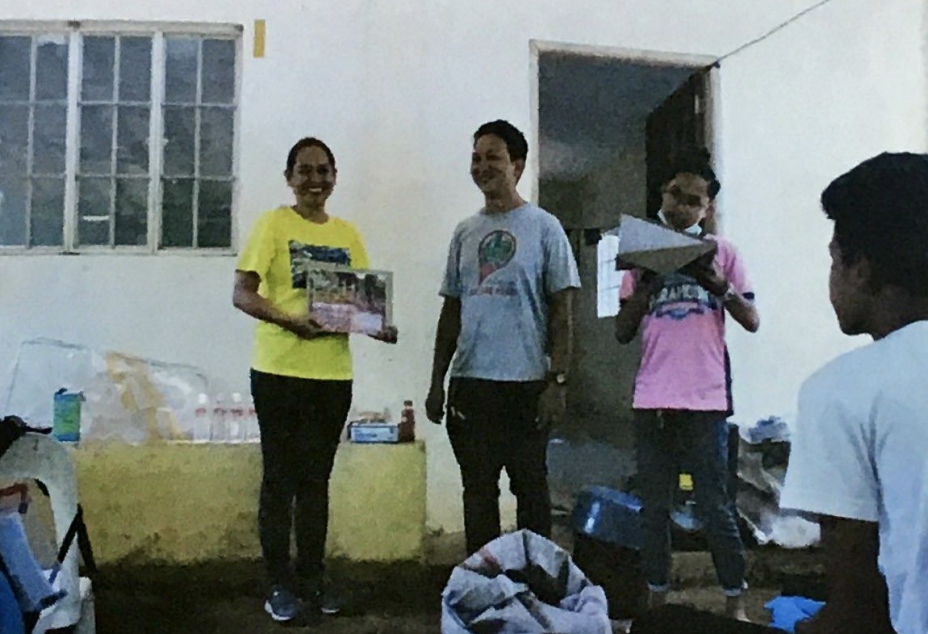Industrial Tree Plantation (ITP)
Industry Strategic Science and Technology Program
Industrial Tree Plantation (ITP) Industry Profile
Industrial tree plantations (ITP), as defined by the Department of Environment and Natural Resources in PD 705, are lands planted mainly for timber producing species, primarily to supply the raw material requirements of existing or proposed wood processing plants and related industries. The Philippine wood industry had its “golden era” during the 1980s, but extraction of wood from natural forests has been regulated and eventually banned which stifled the development of the industry. Currently, Mindanao, especially the Caraga Region or famously known as the “Timber Corridor”, has been developing their ITP industry.
Wood processors, farmers, seedlings providers, traders, furniture makers, and other end-users are the various stakeholders benefiting from wood processing. Two of the most widely planted species in ITP are Falcata [Falcataria falcata (L.) Greuter & R. Rankin] and Yemane (Gmelina arborea Roxb.). Falcata is primarily used for veneer and plywood manufacturing, poles, pulp, paper, furniture, wood crafts, and wood-based kitchen utensils. It is also used as a substitute for premium tree species. On the other hand, Yemane is a source of raw materials for the furniture industry, and can be used for pulpwood production.
Problems in the Industry
The problems in the ITP industry include insufficient sources of certified seed sources, and quality planting materials; low field survival rate because of the absence of management intervention after field planting; less to none interventions on the use of wood wastes for other high value products; and incomplete information on supply and demand for ITP. While the Industrial Tree Plantation Center stated the following issues faced by ITP:
- insufficient system for the production of quality planting materials
- insufficient information on the identification/optimization of technologies for the control of diseases (such as gall rust, pink canker, stem borer, etc.)
- low productivity due to wood defects
- lack of new technologies for value-added products
- limited satellite laboratories
- conflicting/overlapping policies
- lack of livelihood programs and marketing system
Bamboo Policies
| Policy Type | Policy Number | Policy Year | Congress | Policy Title | Policy Description | Policy Objective | Policy Link | Commodity | Classification | info_encoder_stamp | info_date_stamp | info_quashing_remarks | filepath |
|---|---|---|---|---|---|---|---|---|---|---|---|---|---|
| Bill | Senate Bill No. 2358 | 2023 | 19th | An Act Institutionalizing Bamboo Industry Development In The Philippines, Creating The Bamboo Industry Development Center (BIDC), Appropriating Funds Therefor, And For Other Purposes | Bamboo is one of the most economically important non-timber forest products globally. With sixty-two (62) endemic bamboo species in the Philippines, the country is 6th among the largest exporters of bamboo in the world. It is greatly valued for its various economic and ecological benefits. Pangasinan, Tariac and Bukidnon are the leading bamboo producing provinces (DOST, 2022). In a 2020 study by the Department of Environment and Natural Resources (DENR), the global market for non-timber forest products, including bamboo, is estimated at USD 17 billion. Relevant thereto, the Department of Agriculture has also classified bamboo as a high-value crop. With the growing demand from local and international markets, there is a need to address the Identified gaps in order to make the bamboo industry more responsive and resilient. | This bill mandates the formulation of a Philippine Bamboo Industry Development Roadmap, and the establishment of the Philippine Bamboo Industry Development Council (PBIDC). The Council is tasked to provide the overall policy and program direction for the accomplishment and periodic review of the Roadmap. This measure aims to strengthen Executive Order no. 879, series of 2010 which created the Philippine Bamboo Industry Development Council. | https://legacy.senate.gov.ph/lisdata/4222238411!.pdf | Bamboo | Null | Jeff | 11/22/2024 | C:\Users\trist\Documents\Formatting\Output\Bamboo_2024-11-22_processed.xlsx | |
| Bill | Senate Bill No. 2172 | 2023 | 19th | An Act Promoting The Development Of The Bamboo Industry By Strengthening The Philippine Bamboo Industry Development Council, Creating The Bamboo Industry Research And Development Center, Providing Incentives For Bamboo Plantation Development, And Appropriating Funds Therefor | Sec. 2. Declaration of Policy. - It is the policy of the State to promote and support industries that generate employment especially in the rural areas, reduce poverty, foster a sustainable environment, and mitigate the impacts of climate change. It shall also be the policy of the State to foster a self-reliant and independent economy that is supportive of indigenous, scientific and technological capabilities, and skills. To this end, the State shall recognize the strategic importance of the bamboo as a sturdy, versatile, and replenishable material that can be a sustainable source of livelihood and catalyst for agricultural productivity. The State shall likewise ensure the integrated and continuous development of the Philippine bamboo industry through policies and programs that encourage the planting of bamboo, accelerate the development of bamboo-based products and designs, and promote Philippine bamboo products in international markets. It shall establish a program for sustainable utilization, propagation, and promotion of bamboo as furniture, food, construction and design material, and other uses. | This bill seeks to promote the development of the Philippine bamboo industry by mandating the Philippine Bamboo Industry Development Council to formulate the Philippine Bamboo Industry Development Program which shall include programs and projects that will make the Philippine bamboo industry competitive in local and global markets and allow for the creation of local employment and the establishment of community enterprises. Furthermore, this bill seeks the creation of a Bamboo Industry Research and Development Center and the establishment of a Bamboo Industry Development Council by all Local Government Units. | https://legacy.senate.gov.ph/lisdata/4159737888!.pdf | Bamboo | Null | Jeff | 11/22/2024 | C:\Users\trist\Documents\Formatting\Output\Bamboo_2024-11-22_processed.xlsx | |
| Bill | House Bill No. 9144 | 2023 | 19th | An Act Integrating Bamboo As A Sustainable Material For The Built Environment | To facilitate the responsible use of bamboo in construction, this bill tasks relevant agencies and stakeholders with developing the Bamboo Structural Code (BSC). This code will provide essential guidelines, standards, and best practices for the safe and sustainable use of bamboo in building design and construction. Moreover, the proposed legislation places a strong emphasis on promoting bamboo as a sustainable building material, aligning with sustainable consumption and production practices. It encourages public awareness campaigns, educational programs, and incentives for bamboo cultivation. Additionally, it calls for the integration of bamboo-related education into higher education curricula and continuing professional education for architects, interior designers, and engineers, fostering a culture of sustainability within the construction industry. In summary, this bill reflects a commitment to environmental sustainability, economic development, and social well-being. By promoting bamboo as a sustainable building material and establishing the necessary regulatory framework, it seeks to contribute significantly to the Philippines' pursuit of a balanced and healthful ecology, in harmony with nature, while advancing key aspects of sustainability on both local and global scales. | This bill seeks to establish a comprehensive regulatory framework for the integration of bamboo as a sustainable material for the built environment in the Philippines. Recognizing the critical role of the built environment in addressing contemporary challenges related to environmental conservation, climate change mitigation, and sustainable development, this legislation is designed to promote the responsible use of bamboo as a structural material in construction while advancing key aspects of sustainability. | https://docs.congress.hrep.online/legisdocs/basic_19/HB09144.pdf | Bamboo | Null | Jeff | 11/22/2024 | C:\Users\trist\Documents\Formatting\Output\Bamboo_2024-11-22_processed.xlsx | |
| Bill | House Bill No. 7941 | 2023 | 19th | An Act Promoting The Development Of THe Bamboo Industry By Strengthening The Philippine Bamboo Industry Development Council, Creating The Bamboo Industry Research And Development Center, Providing Incentives For Bamboo Plantation Development, And Appropriating Funds Therefor | SEC. 2. Declaration of Policy. – It is the policy of the State to promote and support industries that generate employment especially in the rural areas, reduce poverty, foster a sustainable environment, and mitigate the impacts of climate change. It shall also be the policy of the State to foster a self-reliant and independent economy that supports indigenous, scientific and technological capabilities, and skills. To this end, the State shall recognize the strategic importance of the bamboo as a sturdy, versatile, and replenishable material that can be a sustainable source of livelihood and catalyst for agricultural productivity. The State shall likewise ensure the integrated and continuous development of the Philippine bamboo industry through policies and programs that encourage the planting of bamboo, accelerate the development of bamboo-based products and designs, and promote Philippine bamboo products in international markets. It shall establish a program for a sustainable utilization, propagation and promotion of bamboo as furniture, food, construction and design material, and other uses. | This bill aims to promote the development of the Bamboo Industry by strengthening the Philippine Bamboo Industry Development Council, creating the Bamboo Industry Research and Development Center, and providing incentives for bamboo plantation development. | https://docs.congress.hrep.online/legisdocs/third_19/HBT7941.pdf | Bamboo | Null | Jeff | 11/22/2024 | C:\Users\trist\Documents\Formatting\Output\Bamboo_2024-11-22_processed.xlsx | |
| Bill | Senate Bill No. 1552 | 2022 | 19th | An Act Establishing A Framework For The Promotion And Development Of A Vibrant Bamboo Industry In The Philippines, Providing For Its Scientific Propagation And Sustainable Utilization, Creating The National Bamboo Council Of The Philippines (Nbcp), Allocating Funds Therefor And For Other Purposes | SECTION 2. Declaration of Policy. — It is the policy of the State to promote and support the development of the bamboo industry as a sustainable resource and employment generator. The State shall help communities and other stakeholders especially in the rural areas to collaborate for the mitigation of the impacts of climate change and promotion of sustainable environment and natural resources, economic prosperity, inclusive growth and reduction of poverty. | This bill seeks to institutionalize the National Bamboo Council of the Philippines and establish an agency that can effectively develop the bamboo industry to generate employment, help the bamboo sector capture a greater market, promote environmental sustainability and help mitigate the impacts of climate change, and assist the government in achieving inclusive economic growth. | https://legacy.senate.gov.ph/lisdata/4003436457!.pdf | Bamboo | Null | Jeff | 11/22/2024 | C:\Users\trist\Documents\Formatting\Output\Bamboo_2024-11-22_processed.xlsx | |
| Bill | Senate Bill No. 1145 | 2022 | 19th | An Act Institutionalizing Bamboo Industry Development In The Philippines, Creating The Bamboo Industry Development Center (Bidc), Appropriating Funds Therefor, And For Other Purposes | The bill aims to institutionalize the PBIDC and create its secretariat, the Bamboo Industry Development Center to formulate a holistic National Bamboo Industry Development Program which covers research, production, processing, marketing, consumption, capacity building, and regulation of the cultivation of bamboo and promote investments in the bamboo industry. | https://legacy.senate.gov.ph/lisdata/3913535573!.pdf | Bamboo | Null | Jeff | 11/22/2024 | C:\Users\trist\Documents\Formatting\Output\Bamboo_2024-11-22_processed.xlsx | ||
| Bill | Senate Bill No. 1118 | 2022 | 19th | An Act Promoting The Development Of THe Bamboo Industry By Strengthening The Philippine Bamboo Industry Development Council, Creating The Bamboo Industry Research And Development Center, Providing Incentives For Bamboo Plantation Development, And Appropriating Funds Therefor | Stressing the great potential of the Philippine bamboo industry in environmental protection and socio-economic development, the bamboo industry warrants protection through natural capital accounting and reforestation and propagation of bamboo plantations. The country's bamboo sector requires fiscal and technical support from the government to make it more competitive in both local and international markets. | This bill seeks to promote the development of the Philippine bamboo industry through policies and programs that promote the planting of bamboo and accelerate the development of bamboo-based designs and products. In this regard, a Bamboo Industry Research and Development Center shall be created, which is tasked to ensure the ffective implementation of the goals and objectives of the measure through research and development, trade and propragation promotion and education, capacity-building initiatives for farmers, processors, designers, and other stakholders in the bamboo industry, among others. | https://legacy.senate.gov.ph/lisdata/3909735538!.pdf | Bamboo | Null | Jeff | 11/22/2024 | C:\Users\trist\Documents\Formatting\Output\Bamboo_2024-11-22_processed.xlsx | |
| Bill | Senate Bill No. 1044 | 2022 | 19th | An Act Strengthening The Development Of The Bamboo Industry In The Philippines, Appropriating Funds Therefor And For Other Purposes | Among others, this bill mandates the formulation of a Philippine Bamboo Industry Development Roadmap, and the establishment of the Philippine Bamboo Industry Development Council and the Bamboo Industry Research and Development Center. The Roadmap shall include, but not be limited to, programs and projects for the scientific propagation, development and management, processing, utilization, business development, and commercialization of Philippine bamboo and bamboo products. On the other hand, the Philippine Bamboo Industry Development Council shall provide the overall policy and program direction and coordinate the activities of the various agencies and instrumentalities to ensure the implementation, accomplishment and periodic review and enhancement of the Roadmap. Indeed, the humble bamboo represents an important resource with tremendous economic, ecological, and environmental benefits for improving rural livelihood, saving forests, and preventing environmental problems. | This bill seeks to institutionalize the goals of Executive Order No. 879 (series of 2010), which created the Philippine Bamboo Industry Development Council (PBIDC). This bill also seeks to strengthen the incentives, assistance and programs available to the Philippine bamboo industry to ensure its rapid development. | https://legacy.senate.gov.ph/lisdata/3899735448!.pdf | Bamboo | Null | Jeff | 11/22/2024 | C:\Users\trist\Documents\Formatting\Output\Bamboo_2024-11-22_processed.xlsx | |
| Bill | Senate Bill No. 615 | 2022 | 19th | An Act Institutionalizing Bamboo Industry Development In The Philippines, Creating The Bamboo Industry Development Center, Appropriating Funds Therefor, And For Other Purposes | Sec. 2. Declaration of Policy. - The State shall provide for a self-reliant and independent economy to its people. It shall support indigenous, scientific and technological capabilities, and skills. It shall establish a program for sustainable consumption, production, propagation and promotion of bamboo as furniture, construction and design materials, food and other uses. It shall promote the bamboo industry for poverty reduction, inclusive growth, environmental conservation and protection, agricultural productivity enhancement and climate change mitigation and adaptation. | This bill seeks to institutionalize bamboo industry development in the Philippines to bring more efficient, transparent, and effective service delivery set-up. | https://legacy.senate.gov.ph/lisdata/3845834914!.pdf | Bamboo | Null | Jeff | 11/22/2024 | C:\Users\trist\Documents\Formatting\Output\Bamboo_2024-11-22_processed.xlsx | |
| Bill | Senate Bill No. 605 | 2022 | 19th | An Act Institutionalizing The Philippine Bamboo Industry Development Program, Appropriating Funds Therefor, And For Other Purposes | With somewhere between 44,000 to 53,000 hectares of bamboo stand across our islands, the bamboo industry is one of the biggest areas of agricultural potential for the country. Even now, without a dedicated institution and development plan to guide the growth of the industry. Bamboo has somehow managed to weather the storm—like the grass itself, the industr/ has proven icself resilient in the face of many challenges. It has kept its relevance as one of our most defining cultural signifiers, bringing a uniquely Filipino stamp to such things as the humble bahay kubo, or the 200 year-old Bamboo Organ of Las Pinas, or the innovative works of celebrated architects and designers like Bobby Mahosa or Kenneth Cobonpue. But we cannot let the future of the bamboo plant lie entirely on its cultural cachet. Right now, we are the fifth biggest bamboo industry in the world, but our numbers pale in comparison to the billion-dollars bamboo industries of China and Vietnam. This industry has so much more potential and there is such a great demand for it in the local and international markets, especially in architecture and design, in chemical and medical industries, and in the culinary industiy. The growth of the bamboo industry will mark a huge win for the nation—economically, culturally, and even environmentally. Despite the bamboo's importance and potential, statistics on its resources, production, and trade in the Philippines remain scarce and inconsistent. The lack of reliable and comprehensive data on Philippine bamboo resources and utilization hinders its sustainable development, and limits bamboo's potential to contribute to the Philippine economy. | This bill seeks to strengthen the Philippine Bamboo Industry Development Council, and create the Bamboo Industry Research and Development Center as the onestop shop for all bamboo industry related activities such as training and education, marketing and promotion, and research and development. | https://legacy.senate.gov.ph/lisdata/3839334847!.pdf | Bamboo | Null | Jeff | 11/22/2024 | C:\Users\trist\Documents\Formatting\Output\Bamboo_2024-11-22_processed.xlsx | |
| Circular | Memorandum Circular No. 30, s. 2012 | 2012 | Null | Directing The Full Implementation Of The Philippine Bamboo Industry Development (PBID) Program | The PBID Council and the DENR, as the lead agency for NGP, shall harmonize the PBID Program with the NGP and identify areas of cooperation and convergence. In the implementation of the PBID Program, the PBID Council may request for assistance and cooperation from other government agencies, the private sector and other stakeholders. All departments, agencies and instrumentalities of the national government, state universities and colleges (SUCs), government-owned and controlled corporations (GOCCs) and local government units (LGUs) are hereby enjoined to support the full implementation of the PBID Program. | This Circular aims to fully implement the Philippine Bamboo Industry Development (PBID) program. | Bamboo | Null | Jeff | 11/22/2024 | C:\Users\trist\Documents\Formatting\Output\Bamboo_2024-11-22_processed.xlsx | ||
| Order | Exceutive Order No. 879, s. 2010 | 2010 | Null | Creating The Philippine Bamboo Industry Development Council (Pbidc) To Promote The Bamboo Industry Development Project And Directing The Use Of Bamboo For At Least Twenty Five (25%) Percent Of The Desk And Other Furniture Requirements Of Public Elementary And Secondary Schools And Prioritizing The Use Of Bamboo In Furniture, Fixtures And Other Construction Requirements Of Government Facilities And Allocating Funds Therefore And Other Purposes. | WHEREAS, it has been established that planting and use of bamboo will significantly contribute to the mitigation of climate change and disaster management considering its carbon capture capability and cheaper reforestation cost. Further, bamboo can be easily transformed into a cash crop for farmers and community-based forest management agreement holders who engaged in its cultivation thereby alleviating poverty; WHEREAS, the growing advocacy for green products is fueling the rapid growth of the US$ 8 billion dollar per annum market for traditional and non-traditional bamboo products, is fast becoming a cost effective and attractive complement and/or alternative to plastic, metal and wood materials and can generate more jobs and self-employment opportunities in both rural and urban areas; WHEREAS, there is a need to assist Local Government Units (LGU) to promote and establish bamboo plantations, crafts and products in flood and landslide prone areas, idle and marginalized agricultural lands, upland areas particularly covered by the Community-Based Forest Management (CBFM) and the resettlement of informal settlers from vital waterways; | This order aims to promote the product development and market access of bamboo products to sustain the development of the bamboo industry. | https://www.officialgazette.gov.ph/2010/05/14/executive-order-no-879-s-2010/ | Bamboo | Null | Jeff | 11/22/2024 | C:\Users\trist\Documents\Formatting\Output\Bamboo_2024-11-22_processed.xlsx |
ISP for ITP
The ISP on ITP has come up with strategies that will focus on improvement of variable yield and good quality. It aims to increase yield per hectare (m3/ha), establish sustainable income for ITP dependent tree farmers in the countryside, and reduce log importation with the increased plantation-sourced timber for the domestic market.
Strategic R&D
Strategic R&D is DOST-PCAARRD’s banner program comprising all R&D activities that are intended to generate outputs geared towards maximum economic and social benefits
Rooted stem cuttings of Batikuling (Litsea leytensis Merr.) treated with different concentrations of IBA as control (A), 100ppm (B), and 200ppm (C) and NAA with...
Transformation of Gmelina from raw material to lignin The program on Value Adding and Waste Recovery for Industrial Tree Plantation Species (ITPS): Forest nanotechnology Interventions...
Selection of plus trees as source of quality seeds Demonstration farms of various genetic materials/provenances (origins) of falcata were established in Bukidnon, Misamis Oriental, and...
This study dealt on the extraction and characterization of lignin from three Industrial Tree Plantation Species (ITPS) namely: Falcata (Falcataria moluccana (Miq.) Barneby & J.W....
In general, the project aimed to fast-track genetic characterization of forest genetic materials of Falcata (Falcataria moluccana (Miq.) Barneby & J.W. Grimes.) and Yemane (Gmelina...
A GHG inventory study was conducted for Industrial Tree Plantation (ITP) production chain in Caraga Region. GHG emissions from ITP activities that include harvesting, minor...
This study generally aims to identify, capture and preserve the remaining wild population of Eucalyptus deglupta, Casuarina equisetifolia and Endospermum peltatum and asses the genetic...
The results of the study showed that it is technically feasible to harvest for veneer production the 3, 5, and 7-year old Falcata trees which...
Low timber production of Falcata (Falcataria moluccana (Miq.) Barneby & J.W. Grimes) plantations in the Philippines can be attributed to the use of planting materials...
This study assessed the genetic diversity and ascertained the genetic structure of all currently available propagated materials of the two commercially important plantation species, Falcata...
Technologies
Products, equipment, and protocols or process innovations developed to improve productivity, efficiency, quality, and profitability in the agriculture and aquatic industries, and to achieve sustainable utilization and management of natural resources
- Published On: March 16, 2022
This project aims to develop a geo-database of ITPs. Specifically, to map the species types, location and extent of ITPs by applying machine learning techniques...
- Published On: March 16, 2022
This study aims to develop protocols on the improvement of quality seeds produced by the Mindanao Tree Seed Center (MTSC), through different seed quality enhancement...
Technology Transfer Initiatives
Technology Transfer initatives ensure that the outputs of R&D and innovations are transformed into viable and applicable technologies that help intended users.
- Published On: March 16, 2022
The establishment of the STCBF will serve as a model for the establishment of ITP in Region 2 with Yemane (Gmelina arborea Roxb.) as main...
Capacity Building
Capacity building efforts of DOST-PCAARRD seek to develop and enhance the R&D capabilities of researchers and academic or research institutions through graduate assistantships, non-degree trainings & development, and/or upgrading of research facilities.
Infrastructure Development
Manpower Development
Policy Research & Advocacy
Analysis of policy concerns and advocacy of science-informed policies ensures that the AANR policy environment is conducive for S&T development and investments.
- Published On: January 16, 2025
The Forestry Development Center (FDC-CFNR-UPLB) is currently implementing a DOST-PCAARRD funded project to develop and advocate for simplified and harmonized policy and governance systems along...
- Published On: January 16, 2025
To enable the ITP industry to realize its significant economic contributions particularly in providing employment and increasing rural incomes, the challenges in the supply chain...


